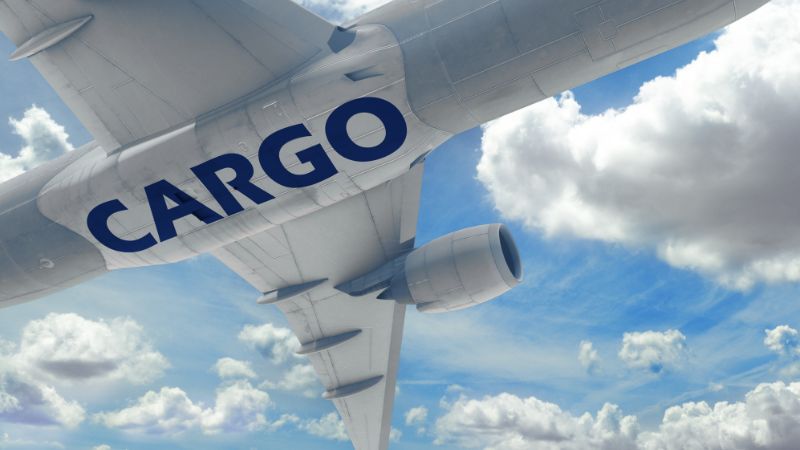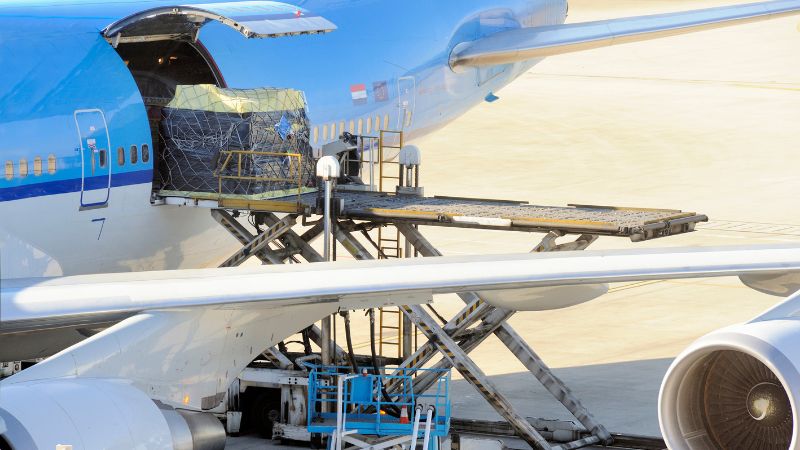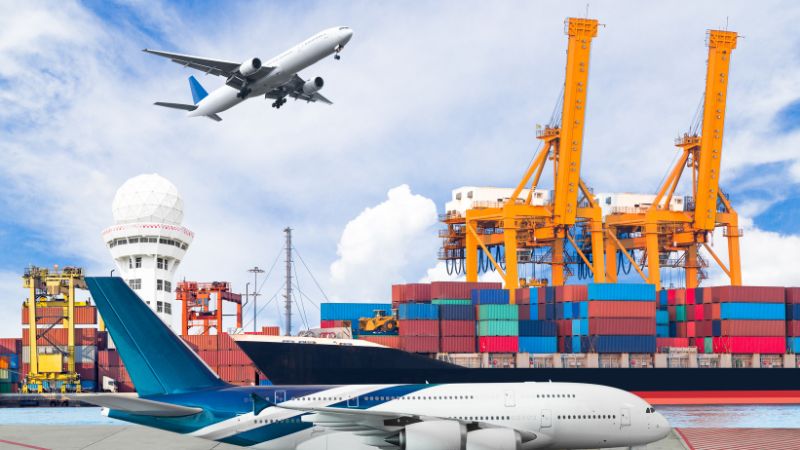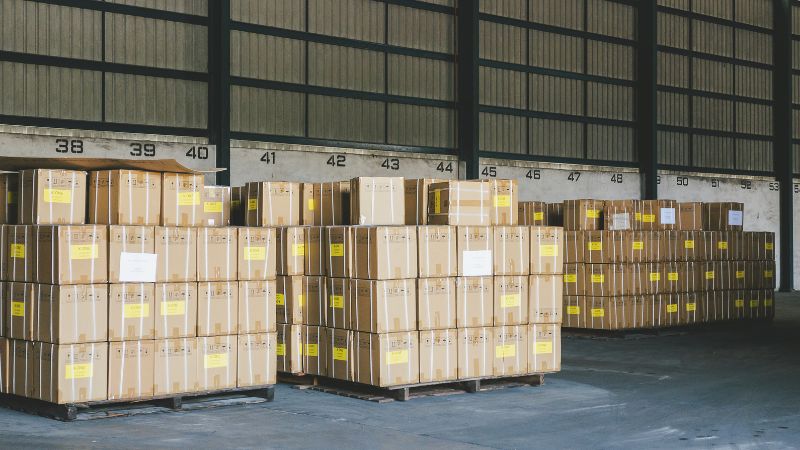China’s air freight industry is a powerhouse that leads global commerce. It’s the backbone of international supply chains connecting manufacturers and consumers worldwide, and ensures fast delivery for any cargo ranging from high-tech electronics to fresh produce. Understanding air freight is the key for businesses to navigate today’s competitive market, and we at Luckstar Logistics are more than willing to help you along the way.

Table of Content
How Air Freight Works
Air freight, just like any other mode of transportation in global supply chain solutions, involves regulatory compliance, trusted third parties, and a long to-do list. Here is a brief summary of the three steps in air freight.
Prepare for shipping
- Source a supplier capable of complying with air transport requirements.
- Decide on the appropriate incoterms (International Commercial Terms), clarifying buyer and seller responsibilities and costs.
- Engage a reputable freight forwarder who will coordinate the logistics of your shipment.
- Provide all necessary commercial documents to your freight forwarder.
Finalize logistics
- Pack your cargo in compliance with all air freight security regulations.
- Review available routes and airline options with your freight forwarder and submit the finalized plan.
- Once your flight is booked, receive a copy of the airway bill after your goods have departed.
Manage arrival procedures
- While your goods are in transit, your freight forwarder will begin customs clearance procedures prior to arrival.
- Upon arrival, the cargo terminal operator retrieves the goods from the aircraft and stores them under customs bond until clearance and collection.
- Once customs clearance is granted, a transport operator will collect your cargo and deliver it to the final destination.
Why Should You Use Air Freight From China
Now that the framework of air freight has been clarified, other questions arise: Why should you choose China air freight solutions, and what benefits does this transportation method bring? This chapter will answer all your questions and show you how robust and efficient Chinese air freight is.
Speed and Efficiency
Air freight from China provides the fastest international shipping method, with deliveries completing in one to three days. Even when delayed, the air freight between China and Europe could still guarantee that the parcel arrives within 7 days. That is significantly faster than the usual 35/40-day sea freight cycle.
This rapid transit time suits time-critical shipments like electronics, pharmaceuticals, machinery, and perishable goods. China airlines maintain strict schedules with frequent departures, ensuring reliable service that weather or port delays rarely disrupt. Moreover, air transport requires less packaging than ocean freight and reduces warehousing needs, lowering overall supply chain expenses.
Global Connectivity
China air freight connects manufacturers and businesses to virtually any global destination through an extensive airport and cargo route network. This connectivity supports efficient international trade, enabling companies to expand market reach and respond swiftly to worldwide customer demands.
Air freight services cover major cities and remote locations alike, offering high security and reliable delivery. Enhanced cargo security results from strict airport controls, while flexibility accommodates various shipment sizes and frequencies. Reduced transit times decrease insurance costs and lower overall risk.
| Year | Air Cargo Volume (Million Tonnes) | Number of International Freight Routes | Major Cargo Airports (Volume Share) |
|---|---|---|---|
| 2000 | ~1.5 | ~20 | Shanghai (PVG), Beijing (PEK), Guangzhou (CAN), … |
| 2010 | 3.70 | ~50 | Shanghai (PVG), Beijing (PEK), Guangzhou (CAN), Shenzhen (SZX), … |
| 2020 | 7.35 | ~100 | Shanghai (PVG), Beijing (PEK), Guangzhou (CAN), Shenzhen (SZX), Hong Kong (HKG), … |
| 2024 | 8.98 | 106 cities in 50 countries | Shanghai (PVG), Beijing (PEK), Guangzhou (CAN), Shenzhen (SZX), Hong Kong (HKG), Chengdu (CTU/TFU), … |
Technological Integration and Digitalization
The industry adopted advanced tracking systems and automated sorting technologies. E-commerce giants like Alibaba and JD.com integrated air logistics into their supply chains. Digital platforms now offer real-time shipment visibility and automated customs clearance. These innovations reduced transit times and improved operational reliability.
Regulatory Changes and Market Liberalization
China eased restrictions on foreign investment in its aviation logistics sector. The Civil Aviation Administration of China (CAAC) introduced policies encouraging private and international participation. These reforms attracted global freight carriers and enhanced competitive dynamics. They also facilitated the growth of dedicated cargo airlines within China.
What Do I Need to Do Ahead of Air Shipping from China?
With all the benefits of China freight via air explained, you now would have more confidence adopting it in your cross-border shipping process. This section will cover what you need to do in advance to ensure that all procedures carry forward smoothly while complying with laws and regulations.

Understand Prohibited and Restricted Items
Check the latest list of prohibited items for air cargo, which typically includes explosives, flammable materials, toxic substances, and items like firearms, counterfeit goods, and perishable goods without proper packaging.
Some items require special permits or certifications, such as chemicals, batteries, medical devices, and food products. Ensure your goods comply with these regulations.
Prepare Necessary Freight Documents
- Commercial Invoice: A detailed invoice listing the goods, their value, and the terms of sale.
- Packing List: Specifies the contents of each package, including weight, dimensions, and quantity.
- Certificate of Origin: Required for certain goods to claim preferential tariff rates or comply with destination country regulations.
- Export License: For restricted or controlled goods, such as military items or dual-use technologies.
- MSDS (Material Safety Data Sheet): Required for hazardous materials.
- Other Certifications: Depending on the product, you may need certifications like CE, FCC, or RoHS.
Choose a Reliable Freight Forwarder or Airline
Research and select a reputable freight forwarder or airline with experience in air freight shipping from China. Compare quotes, services, and transit times to find the best option for your needs. Remember to provide accurate details about your cargo, including weight, dimensions, and any special handling requirements.
Finally, confirm the flight schedule and ensure your cargo is ready for pickup or delivery to the airport in advance.
Package and Label Your Cargo
Use sturdy, appropriate packaging to protect your goods during transit. Ensure all packages are labeled with the correct shipping information, including the recipient’s address, contact details, and any special handling instructions.
For hazardous cargo types, follow IATA (International Air Transport Association) packaging and labeling guidelines.
Arrange Customs Clearance
Work with your freight forwarder to handle customs clearance. Ensure your goods comply with both Chinese export regulations and the destination country’s import regulations. Pay any applicable duties, taxes, or fees in advance or arrange for payment at the destination.
Also, consider purchasing cargo insurance to protect your goods against loss, damage, or theft during transit.
Prepare for Delivery at the Destination
Obtain a tracking number from your freight forwarder or airline and use it to monitor the progress of your shipment. Ensure the recipient is aware of the estimated delivery date and any required customs clearance procedures at the destination airport. Be sure to provide any necessary documentation to the recipient to facilitate smooth customs clearance and delivery.
Types of Air Freight Services
Air freight from China offers multiple service levels to match your shipping needs. Each option balances speed, cost, and handling capabilities to give you flexibility when importing goods.

Standard Air Freight
Standard air freight provides a balanced approach between cost and transit time, making it a comparatively cost-effective solution. For example, this service typically concludes a china to usa shipping request in 5-7 business days. It’s perfect when you need reliable delivery without the premium cost of express options.
Standard shipping follows a predictable schedule with regular departures from major Chinese airports like Shanghai, Guangzhou, and Beijing. Your cargo travels on commercial passenger flights or dedicated freight planes.
Benefits of standard air freight:
- Lower cost than express services
- Regular scheduled departures
- Suitable for goods weighing over 100 kg
- Good tracking capabilities
Many logistics providers offer door-to-door service with standard air freight, handling customs clearance and final delivery to your warehouse.
Express Air Freight
When time is critical, express air freight delivers your goods from China in record time. This premium service can get your shipments to you in as little as 1-3 days, depending on the destination.
Express services prioritize your cargo, ensuring it gets loaded onto the first available flight. Your goods typically travel via major carriers like DHL, FedEx, or UPS with dedicated handling teams.
Key features of express air shipping:
- Priority boarding on flights
- Expedited customs clearance
- Real-time tracking systems
- Guaranteed delivery times
This option costs significantly more than standard service but provides peace of mind for urgent shipments. Express is ideal for time-sensitive products, samples, or emergency stock replenishment.
How to Calculate Air Freight Cost?

Figuring out how much it costs to ship by air from China is easier than you might think. The basic formula is quite simple: multiply the weight of your cargo by the shipping rate per kilogram.
For example, if you’re shipping 171 kilos of products, and the rate is $5 per kilo, your transport cost would be $855.
But wait! There’s something called volumetric weight (or dimensional weight) you need to know about. Airlines don’t just consider gross weight; they also look at how much space your packages take up.
To calculate volumetric weight:
-
Measure your package dimensions (length × width × height) in centimeters
-
Divide this number by 6,000
-
Compare this with the actual weight
-
The airline charges you for whichever is higher
Weight and volume are equally important, and they will be the major consideration for maintaining the cost within a reasonable range, as air freight usually becomes more expensive than sea freight when volume-to-weight ratio is high.
If you wish to know more, check out this article on how to calculate volumetric weight in different situations.
Remember that other freight charges might apply too! These often include:
- Pickup charges
- Export customs clearance
- Documentation fees
- Fuel surcharges
- Import duties
- Insurance
Freight forwarding costs can add up, so it’s worth getting quotes from different providers. Many companies offer free freight rate calculators online to help you budget accurately.
Regulatory Landscape
Understanding the rules for China air freight can save you time and money. These regulations can be complicated but following them correctly keeps your shipments moving smoothly.
Domestic Regulations
In China, the Civil Aviation Administration of China (CAAC) oversees all air freight operations. You need to know that all cargo must pass through security screening before loading onto aircraft. This includes x-ray scanning and physical inspections when necessary.
Chinese customs requires complete documents including:
- Commercial invoice
- Packing list
- Bill of lading
- Import/export licenses (for controlled goods)
Remember that compliance with Chinese customs regulations is essential before shipping. Many shippers face delays because of incomplete paperwork.
Special permits are needed for dangerous goods, oversized cargo, and valuable items. The rules change periodically, so check for updates before each shipment.
International Compliance
When shipping from China to international destinations, you must follow both Chinese regulations and those of the destination country. This means understanding multiple sets of rules.
International air freight must comply with:
- IATA dangerous goods regulations
- Security requirements of destination countries
- Import duties and taxes documentation
- Product-specific certifications
You should be aware of global regulations reshaping logistics, including carbon emissions rules. The EU’s Carbon Border Adjustment Mechanism affects shipments to European countries.
Proper air freight compliance ensures your shipments avoid customs holds and penalties. Working with experienced freight forwarders can help navigate these complex requirements.
Air Freight Terminology You Need to Know
Shipping by air involves specific terms that can impact your logistics. Here’s a quick look at essential air freight terminology to help you make better shipping decisions.
| Term | Definition |
|---|---|
| Air Waybill (AWB) | A bill of lading covering both domestic and international flights transporting goods to a specified destination. It serves as a receipt for the shipper and indicates the carrier’s obligation to carry the goods. |
| Aircraft Container | A unit load device (ULD) that links directly with the airplane cargo handling and restraint system. |
| Allotment | Blocked space by airlines on behalf of forwarders/shippers. |
| ATA | Actual Time of Arrival. |
| ATD | Actual Time of Departure. |
| Bonded Warehouse | A warehouse authorized by customs for storage or manufacture of goods on which payment of duties is deferred until the goods enter the customs territory. |
| Break Bulk (B/B) | The process of breaking down consolidated air freight into individual consignments for customs clearance. |
| Carnet | A customs document permitting the holder to carry or send merchandise temporarily into certain foreign countries without paying import duties or posting bonds. |
| Combi Aircraft | An aircraft configured to carry both passengers and cargo on the main deck. |
| Consignment | Delivery of merchandise from an exporter to an agent under agreement that the agent sell the merchandise for the account of the exporter. |
| Import Restrictions | Restrictions applied by a country to control the volume of goods coming into the country, which may include tariffs, quotas, or other measures. |
| Incoterms | A set of rules maintained by the International Chamber of Commerce (ICC) that define the responsibilities of sellers and buyers in foreign trade contracts. |
| Insurance Certificate | A certificate used to assure the consignee that insurance is provided to cover loss or damage to the cargo during transit. |
| Intermediate Consignee | An intermediary such as a bank or forwarding agent that acts on behalf of the exporter, purchaser, or ultimate consignee for the purpose of effecting delivery. |
| Intermodal | Movement of goods by more than one mode of transport, such as airplane, truck, railroad, and ship. |
| lATA | International Air Transport Association |
| ICAO | International Civil Aviation Organization |
| Main Deck | The deck on which the major portion of payload is carried, also known as the upper deck of an airplane. |
| Packing List | A shipping document issued by the shipper to the carrier, customs, and consignee, detailing information such as package count, product count, measurements, and weights. |
| POD | Proof Of Delivery, a cargo/package receipt with the signature of the recipient. |
Why Use a Freight Forwarder like Luckystar Logistics?
Shipping by air from China can be complex, but working with a freight forwarder makes the process much easier. When you work with experienced professionals, you get access to reduced shipping costs with better rates and smoother customs clearance.

Cost Savings
Freight forwarders can offer lower shipping rates than if you tried to arrange shipping directly with carriers like DHL or FedEx. Throughout our years of operation, we have served a wide range of clients, and built a strong partnership with trustworthy major carriers. Choosing us euqals lower rates!
Shorter Transit Time
Time is money in business. Luckystar specializes in reliable and flexible door-to-door freight shipping by air, sea, or road, ensuring on-time delivery across the globe, providing speed and efficiency that can give your business a competitive edge.
Customs Expertise
Navigating customs can be a headache. With over 20 years of combined experience in logistics, our dedicated team is equipped to handle all your international transportation needs. This helps to prevent delays and potential fines.
Personalized Customer Service
You’ll also benefit from personalized service. Our flexible logistics solutions enable us to adapt to industry changes and meet your needs. From warehousing to customs clearance, we’ve got you covered in every step with end-to-end services.
Contact Us
Luckystar Logistics provides trusted shipping services to customers in China, the United States, Canada, Europe, and many other countries and regions in global markets at competitive prices. We can help you navigate the complexities of shipping by air from China with ease and confidence.
If you’re looking for a reliable partner to handle your air freight logistics, send us a free quote and reach out to Luckystar today!
Frequently Asked Questions
How Safe and Reliable Is Air Freight?
Air freight is considered one of the safest and most reliable modes of transporting goods internationally. Airlines have strict security measures and advanced tracking systems, reducing the risk of theft, damage, or loss. The cargo is handled by experienced professionals and spends minimal time in transit, which decreases exposure to potential hazards. Delays are rare, as airlines maintain regular schedules and can quickly reroute shipments if necessary. It is ideal for valuable, urgent, or fragile shipments.
Does Air Freight Always Cost More than Ocean Freight?
Air shipping is usually more expensive than ocean freight. However, for small shipments, the higher port and customs fees can make air freight prices comparable. In these cases, choosing airlines may cost only slightly more than ocean freight but is much faster. Compare the pros and cons of air and sea shipping to choose the best option.
How to Reduce Air Freight Shipping Cost?
To reduce the high costs and of air shipping, consider these three tips:
- Use Luckystar’s door-to-door service—we find the most cost-effective transport solutions and handle carrier arrangements for you.
- Pack your goods as tightly as possible, since larger packages cost more due to volumetric weight pricing.
- Work with our experts at Luckystar closely to make sure all documents are accurate and complete, minimizing the risk of delays and extra charges.
Should I Purchase Insurance Through a Freight Forwarder?
Yes, it is strongly encouraged. Freight forwarders like us often have access to comprehensive insurance options tailored to your shipment type and route. This can simplify the process, as we handle all the paperwork and claims procedures if something goes wrong. Additionally, relying solely on carrier liability may not fully cover the value of your shipment. Purchasing insurance through your freight forwarder ensures you are adequately protected and can recover your financial losses more easily in case of unforeseen events.
What are the alternatives to the air freight?
Sea freight is the most common substitute, especially for shipping in large volume or transporting heavy goods internationally. Although slower than air transport, sea freight offers significant savings on shipping costs. It’s widely used for goods like raw materials, machinery, and consumer products. Sea freight is also flexible, with various container options and frequent global routes, making it a practical and economical choice for many businesses when speed is not a top priority.
